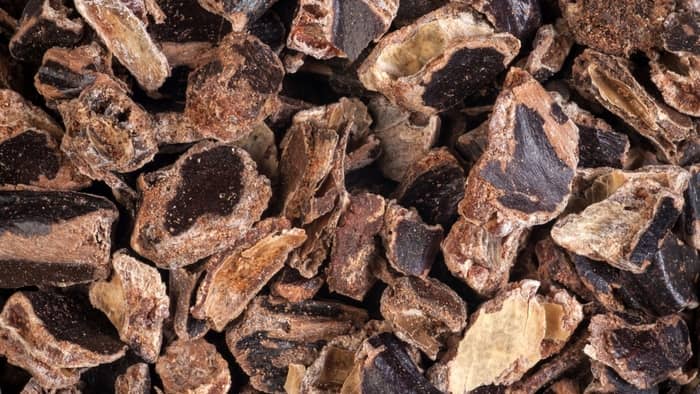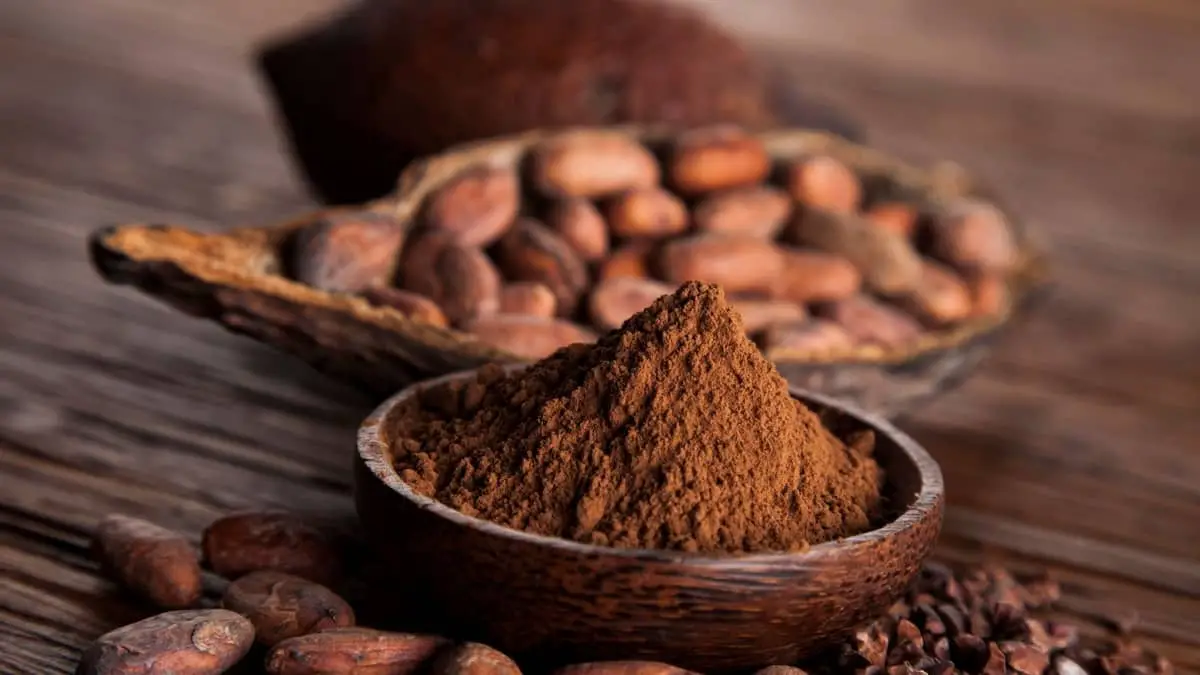Last Updated on February 4, 2023
Unsweetened cocoa powder is a popular ingredient for making chocolate cakes, cookies, brownies, and other desserts. However, if you don’t have it on hand, you will want to know a substitute for the unsweetened cocoa powder you can use. These substitutes can be a great option if you find yourself in a pinch.
Unsweetened cocoa powder is key to giving desserts a rich chocolate flavor and color. It is often an important ingredient in many chocolate desserts. However, if need be, you can use the ingredients in place of it. Let’s take a look at a substitute for unsweetened cocoa powder.
What is Unsweetened Cocoa Powder?
Unsweetened cocoa powder is a chocolate product that adds a rich, delicious chocolate flavor to foods and beverages. Cocoa powder is made by removing cocoa butter from the cocoa beans during processing. The leftover dried solids are cocoa powder.
To be exact, when making cocoa powder, the cocoa beans are fermented, dried, roasted, and broken down into nibs. The nibs are pressed to remove 75% of their cocoa butter, which in return leads to chocolate liquor. The liquor is dried in a solid, which is then ground into unsweetened cocoa powder.
Unsweetened cocoa powder is ideal for baking because it allows you to control the exact amount of sugar you add to a recipe. You do not want to use sweetened cocoa powder or cocoa mix in place of unsweetened cocoa powder. Since they both have sugar added to them, they will not allow you to control the sugar levels in your dessert.
The Cocoa Trader Dutch Processed Black Cocoa Powder (1lb) –
Though many people think that cocoa mix and unsweetened cocoa powder are the same things, they are not. The instant cocoa mix creates hot chocolate when hot water or milk is added. It will not work as a substitute in recipes as it is made in a different process and is a different product.
Natural Cocoa Powder vs Dutch-Process Cocoa Powder
There are two main types of unsweetened cocoa powder; natural and Dutch-process. Though in certain recipes they can be used interchangeably, that is not always the case. So, if your recipe specifically calls for one over the other, be sure to use the one it calls for.
Natural cocoa powder is the natural powder that comes from roasting cocoa beans. It has a very concentrated chocolate flavor and by itself, it is acidic and bitter.
Natural cocoa powder is common in recipes that call for baking soda. The two ingredients react with each other to create a desirable rise in baked goods. It tends to be lighter in color, with almost a reddish-brown hue.
Dutch-process cocoa powder uses cocoa beans that are washed with an alkaline solution of potassium carbonate. Washing them in this solution makes the cocoa powder neutral. So, in return, it is often used in recipes that call for baking powder instead of baking soda.
Dutch process tends to be darker in color. In addition, it often tends to be slightly milder in flavor than natural. If a recipe does not specify natural or Dutch-process then you can use either.
Substitute for Unsweetened Cocoa Powder
If you are making a recipe with unsweetened cocoa powder but realize you are all out, do not fret. There are substitutions you can use that will make up for this chocolate ingredient. Though it is always ideal to use unsweetened cocoa powder when a recipe calls for it, these substitutions will do the trick.
These substitutions are the best options to use for your chocolate recipes. You want to avoid using bars of milk, dark or semi-sweet chocolate as they won’t have the same effect.
Dutch-Process Cocoa Powder
If you have a recipe that calls for natural cocoa powder, you can use the Dutch process in its place with the right adjustments. When adding Dutch-process in place of natural cocoa powder, for every three tablespoons of cocoa powder also add 1/8 teaspoon cream of tartar, white vinegar, or lemon juice. This serves as the acid it needs when using cocoa powder to leaven your baked goods.
Carob Powder or Carob Chips
Carob powder or carob chips can both work as substitutes for cocoa powder. They are great alternatives if you have a chocolate allergy or are sensitive to caffeine. However, it will add a bit of sugar, so you may need to make adjustments, but carob powder will not add much fat.
Carob chips will add both a small amount of fat and sugar, so you will likely have to adjust accordingly. To do so, omit one tablespoon of fat from your recipe and reduce the sugar by one teaspoon to one tablespoon. Use one ounce of melted tablespoons of carob chips for every three tablespoons of cocoa powder the recipe calls for.

Unsweetened Baking Chocolate
Unsweetened baking chocolate is a great option as a cocoa substitute in recipes. Since unsweetened baking chocolate contains additional fat, you will need to adjust accordingly.
For every three tablespoons of cocoa powder your recipe call for, use one ounce of unsweetened baking chocolate in its place. To make up for the additional fat in the chocolate, omit one tablespoon of butter, oil, or shortening from the recipe.
If you are using unsweetened baking chocolate, carob powder, or carob chips, your recipe may not have as strong of a chocolate flavor as it normally would. However, your recipe will still have a wonderful flavor and texture, even with the substitutions.
Cacao Powder
Cacao powder is another great substitute. While it’s spelled very similar to cocoa powder, they are not the same ingredient. One of the reasons it’s so great is that it can be directly swapped out with a 1:1 ratio. However, due to its overwhelming taste, you may want to use slightly less than your recipe calls for.
There are many positives to using cacao powder. One of them is that it’s a far healthier alternative, as it’s high in antioxidants and not quite as processed. Another bonus is that it’s full of rich flavor. However, some people see this as a negative, because the flavor can be very strong and overwhelming. You may want to use extra sugar or sweetener to balance the bitterness.
Dark Chocolate
Much like cacao powder, you can use dark chocolate as a direct replacement, meaning that the ratio is 1:1. However, it’s important to melt the chocolate before adding it to your recipe. This will ensure the best results. On the flip side. dark chocolate is super easy to find, and usually inexpensive too, making it a great option. It has a slightly bitter taste, but it’s full of rich flavor which can be greatly added to many baking recipes.
Chocolate Chips
Chocolate chips are another inexpensive option that you can buy from almost anywhere. However, the replacement is not 1:1 this time. If a recipe calls for 2 tablespoons of cocoa powder, you’ll need 2 tablespoons of melted chocolate; the chocolate must be melted.
While the chocolate flavor is bitter and rich, a downside is that chocolate chips will usually have added sugar and butter. In this case, you’ll need to use less sugar than your recipe calls for.
Hot Chocolate Mix
While hot chocolate isn’t the best option, you can use it if you have nothing else. However, you’ll need to double the amount the recipe calls for. For example, if a recipe asks for 1 teaspoon of cocoa powder, you’ll need 2 teaspoons of hot chocolate mix.
Hot chocolate mix can be quite unpredictable in baking. This is because many extra ingredients are usually added to the hot chocolate mix. But in terms of texture and appearance, it will be a perfect substitute.
Can Nesquik Be Used as Cocoa Powder?
Absolutely! Much like the hot chocolate mix, the texture, and look will be very similar to what you’re used to from cocoa powder. However, the taste can differ quite dramatically. If you don’t like the taste of Nesquik, it may be best not to use it in your baking or cooking.
What is in Cocoa Powder?
There is typically only one ingredient in cocoa powder, and that is simply cocoa beans. The cocoa beans are then crushed down, which turns them into cocoa powder.
Nutritional Information of Cocoa Powder
You may be wondering what the nutritional value when is when it comes to cocoa powder. Each cup of dry cocoa powder contains the following:
- calories: 196
- fat: 12g
- saturated fat: 7g
- sodium: 18mg
- carbohydrates: 50g
- dietary fiber: 29g
- sugar: 1.5g
- protein: 17g
Delicious and Simple Substitutes for Unsweetened Cocoa Powder
Cocoa powder is a key ingredient in many recipes to achieve a delicious chocolate flavor. There are two types of unsweetened cocoa powder; natural and Dutch-process. Though in several recipes they are interchangeable, in others it is important to use the specific one it calls for.
If you find yourself without unsweetened cocoa powder while baking, there are some great substitutions for cocoa. You can use unsweetened baking chocolate, carob powder, and carob chips. You can also use Dutch-process in place of natural, as long as you also add cream of tartar, white vinegar, or lemon juice.
Do you have any questions regarding a substitute for unsweetened cocoa powder? If so, please ask any questions in the comment section below regarding this popular ingredient in chocolate recipes. And remember, sharing is caring!

Ever since she was a young girl, Anna has been a lover of desserts. As an adult, she enjoys
baking a variety of desserts from cakes, cookies, brownies, bread, and more from scratch. She
enjoys sharing her passion for baking with others who also have a sweet tooth. From properly
measuring ingredients to making sure they are the correct temperature, Anna knows the
importance small details can make in baking. She wants to share her experience with others in
hopes they can make the most delicious baked goods. When she’s not busy blogging, Anna
enjoys trying new recipes in the kitchen.


